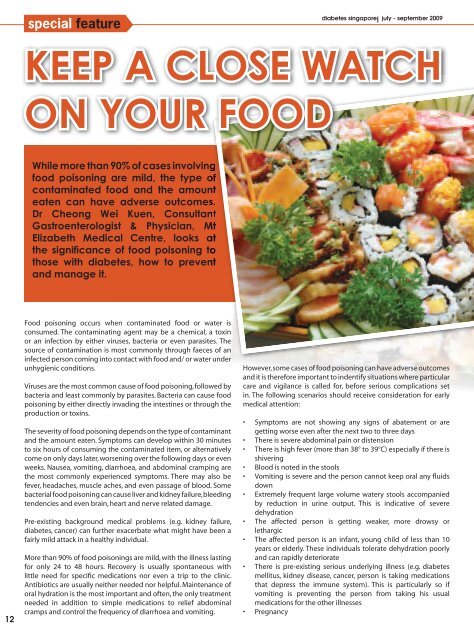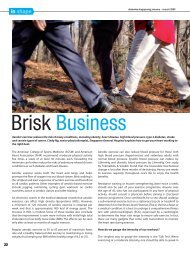KEEP A CLOSE WATCH ON YOUR FOOD
keep a close watch on your food - Diabetic Society of Singapore
keep a close watch on your food - Diabetic Society of Singapore
- No tags were found...
Create successful ePaper yourself
Turn your PDF publications into a flip-book with our unique Google optimized e-Paper software.
special feature<br />
diabetes singapore july - september 2009<br />
<strong>KEEP</strong> A <strong>CLOSE</strong> <strong>WATCH</strong><br />
<strong>ON</strong> <strong>YOUR</strong> <strong>FOOD</strong><br />
While more than 90% of cases involving<br />
food poisoning are mild, the type of<br />
contaminated food and the amount<br />
eaten can have adverse outcomes.<br />
Dr Cheong Wei Kuen, Consultant<br />
Gastroenterologist & Physician, Mt<br />
Elizabeth Medical Centre, looks at<br />
the significance of food poisoning to<br />
those with diabetes, how to prevent<br />
and manage it.<br />
12<br />
Food poisoning occurs when contaminated food or water is<br />
consumed. The contaminating agent may be a chemical, a toxin<br />
or an infection by either viruses, bacteria or even parasites. The<br />
source of contamination is most commonly through faeces of an<br />
infected person coming into contact with food and/ or water under<br />
unhygienic conditions.<br />
Viruses are the most common cause of food poisoning, followed by<br />
bacteria and least commonly by parasites. Bacteria can cause food<br />
poisoning by either directly invading the intestines or through the<br />
production or toxins.<br />
The severity of food poisoning depends on the type of contaminant<br />
and the amount eaten. Symptoms can develop within 30 minutes<br />
to six hours of consuming the contaminated item, or alternatively<br />
come on only days later, worsening over the following days or even<br />
weeks. Nausea, vomiting, diarrhoea, and abdominal cramping are<br />
the most commonly experienced symptoms. There may also be<br />
fever, headaches, muscle aches, and even passage of blood. Some<br />
bacterial food poisoning can cause liver and kidney failure, bleeding<br />
tendencies and even brain, heart and nerve related damage.<br />
Pre-existing background medical problems (e.g. kidney failure,<br />
diabetes, cancer) can further exacerbate what might have been a<br />
fairly mild attack in a healthy individual.<br />
More than 90% of food poisonings are mild, with the illness lasting<br />
for only 24 to 48 hours. Recovery is usually spontaneous with<br />
little need for specific medications nor even a trip to the clinic.<br />
Antibiotics are usually neither needed nor helpful. Maintenance of<br />
oral hydration is the most important and often, the only treatment<br />
needed in addition to simple medications to relief abdominal<br />
cramps and control the frequency of diarrhoea and vomiting.<br />
However, some cases of food poisoning can have adverse outcomes<br />
and it is therefore important to indentify situations where particular<br />
care and vigilance is called for, before serious complications set<br />
in. The following scenarios should receive consideration for early<br />
medical attention:<br />
• Symptoms are not showing any signs of abatement or are<br />
getting worse even after the next two to three days<br />
• There is severe abdominal pain or distension<br />
• There is high fever (more than 38° to 39°C) especially if there is<br />
shivering<br />
• Blood is noted in the stools<br />
• Vomiting is severe and the person cannot keep oral any fluids<br />
down<br />
• Extremely frequent large volume watery stools accompanied<br />
by reduction in urine output. This is indicative of severe<br />
dehydration<br />
• The affected person is getting weaker, more drowsy or<br />
lethargic<br />
• The affected person is an infant, young child of less than 10<br />
years or elderly. These individuals tolerate dehydration poorly<br />
and can rapidly deteriorate<br />
• There is pre-existing serious underlying illness (e.g. diabetes<br />
mellitus, kidney disease, cancer, person is taking medications<br />
that depress the immune system). This is particularly so if<br />
vomiting is preventing the person from taking his usual<br />
medications for the other illnesses<br />
• Pregnancy
special feature<br />
diabetes singapore july - september 2009<br />
© David Smith<br />
© Yinicius Tupinamba<br />
In the case of diabetic patients, be especially vigilant.<br />
• Diabetic sugar control usually worsens when there is<br />
superimposed illness or infection of any sort and often, this can<br />
precipitate a diabetic emergency (e.g. ketosis, hyperosmolar<br />
coma)<br />
• Sugar control becomes erratic and more difficult because of<br />
unpredictable intake and irregularly timed meals , in addition<br />
to the inability to take the usual diabetic medications<br />
• Diabetic patients who have concomitant kidney damage are<br />
at higher risk as kidney function may worsen very rapidly with<br />
dehydration<br />
It is therefore advisable that early medical consultation is obtained<br />
unless the food poisoning is very mild and is showing signs of<br />
improvement within the next 24 hours.<br />
While diabetic patients are generally at higher risk of getting<br />
infections, there is no evidence that they are particularly prone<br />
to getting food poisoning as long as the usual precautions are<br />
observed.<br />
Precautions for reducing the risk of food poisoning<br />
Cleanliness<br />
• Wash your hands, cutting or food processing surfaces, especially<br />
before and after handling raw meat and poultry<br />
• Cleaning sponges should be cleaned with detergent and hot<br />
water after use<br />
Avoid cross contamination<br />
• Avoid contact between raw meats or meat juices with other<br />
food especially fruits, vegetables, cooked food or other readyto-eat<br />
foods e.g. cheese<br />
Proper storage and handling of food<br />
• Refrigerator should be maintained at least 4°C with the freezer<br />
at 10°C<br />
• Defrost frozen foods and marinate meat and poultry in the<br />
refrigerator. Cook meat and poultry immediately after thawing<br />
• Do not repeatedly freeze and thaw food<br />
• Do not leave food at room temperature for more than two<br />
hours, and only an hour if the room temperature is 30°C or<br />
higher<br />
• Pick up raw foods last during your shopping trip. Get them<br />
home quickly. Unload perishable foods first to the refrigerator<br />
Cook foods at proper temperatures<br />
• Use a food thermometer to check the internal temperatures of<br />
cooked meat. Cook meats till internal temperature is at least<br />
70° to 80°C<br />
Other Issues<br />
• Food poisoning tends to occur at picnics, school cafeterias,<br />
and large social functions as food tends to be left out of the<br />
refrigerator too long or food preparation techniques may not<br />
be clean<br />
• When travelling, eat only hot, freshly cooked food. Drink water<br />
only if it’ has been boiled. DO NOT eat raw vegetables or<br />
unpeeled fruit.<br />
• Never use ice unless you are sure it is made from adequately<br />
boiled or filtered water<br />
13







